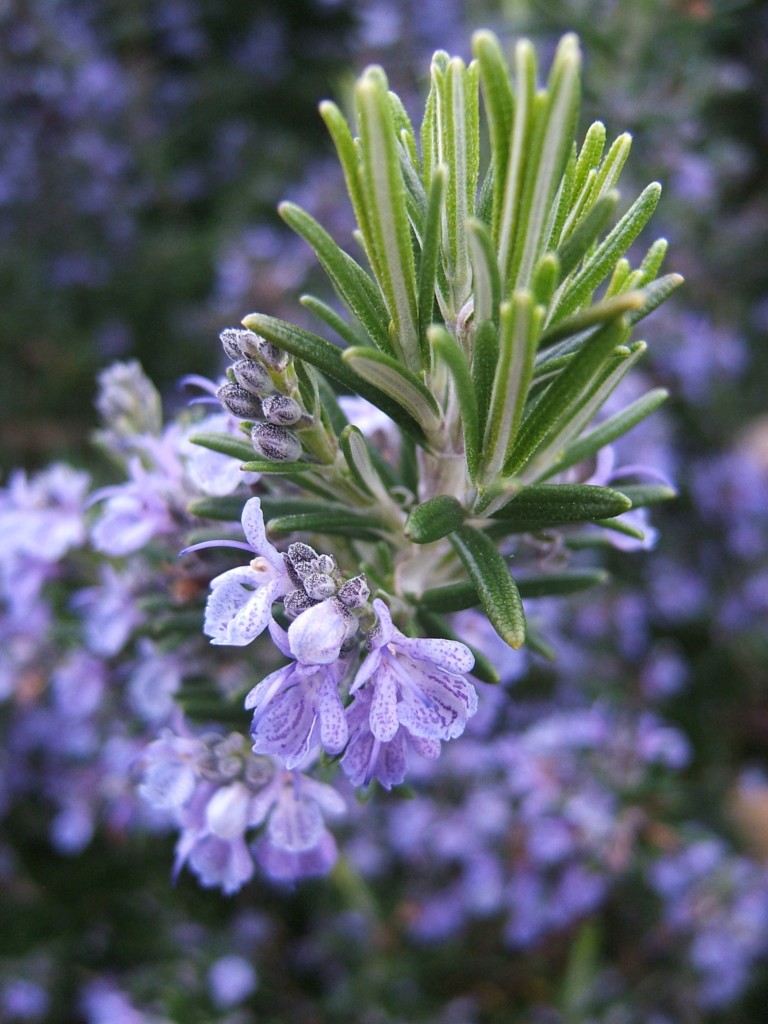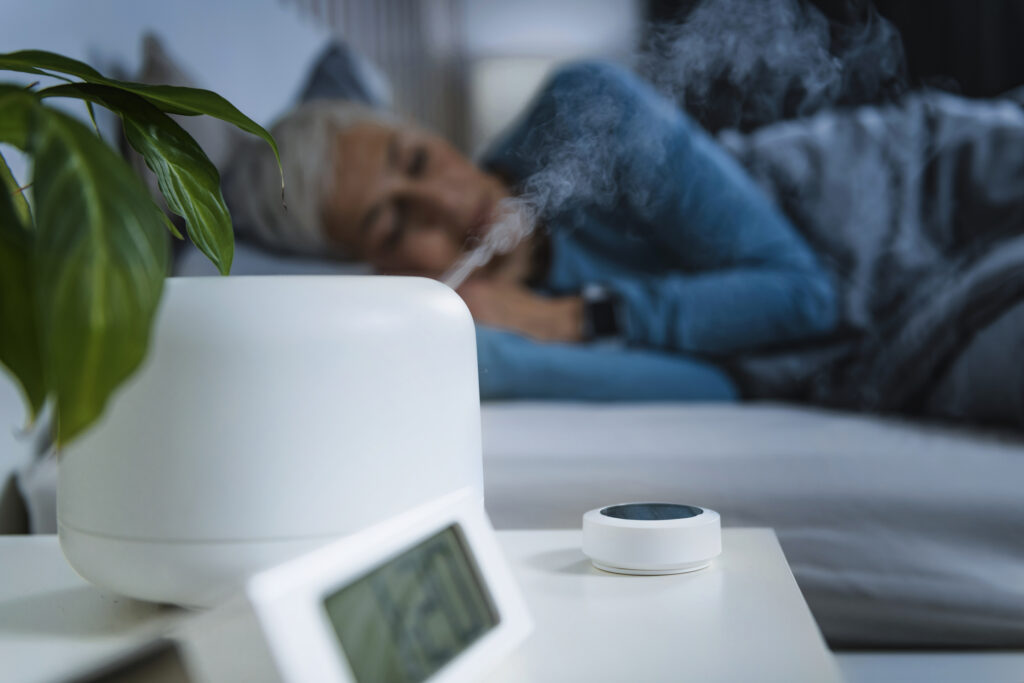Some time ago a research paper that looked at the brains of perfumers caught my curiosity. I knew that smelling essential oils could have a profound impact on our psychological wellbeing, and I wanted to see if there are actual, physiological changes that happen in the brains of people frequently exposed to scents. And as you might have guessed, there were. Otherwise this would not have been a great introduction to this article, would it?
Turns out that in this particular research (Delon-Martin et al 2013) they found that engaging your sense of smell on a regular basis does have a profound impact on our brains, and structural differences were observed between the brains of trained professionals (perfumers) and untrained people to the point of certain regions having a significantly larger volume.
We’re finding more and more evidence telling us that regular exposure to scent has a significant impact on our brain health in general, and specifically on our cognitive function. This is important given that cognitive decline is one of the biggest emerging public health challenges.
Let’s explore what we know and what we can do!
What is cognitive function?
The term ‘cognitive function’ encompasses several areas related to our ability to carry out tasks. It describes mental processes that are involved in acquisition of knowledge, manipulation of information and reasoning. This generally includes attention, perception, learning, memory, decision making and language abilities. Basically any time we use our brain for anything, we are employing our cognitive function.
 Cognitive function tests are increasingly common as a part of regular health screenings and can range from a very simple assessment such as Mini-cog (free to download) to more extensive and thorough testing protocols such as 5-Cog (not free), which tests many different abilities: attention, memory, visuospatial, language and reasoning skills.
Cognitive function tests are increasingly common as a part of regular health screenings and can range from a very simple assessment such as Mini-cog (free to download) to more extensive and thorough testing protocols such as 5-Cog (not free), which tests many different abilities: attention, memory, visuospatial, language and reasoning skills.
Cognitive dysfunction
Talking to my relatives and friends I see a recurring worry that becomes more and more pronounced as we all grow older – most of us are afraid we are going to lose our cognitive capacity, or will even develop a form of dementia. Indeed, as I mentioned in the opening, cognitive dysfunction is one of the leading public health problems. Not feeling like your brain is working properly can be unsettling!
The ‘good’ news is that a certain level of cognitive decline is a normal part of aging. Just as our skin loses elasticity, so does our mind, and we lose some cognitive capacity. The one thing that seems to improve with age is our vocabulary (Eikelboom et al 2020). So when do you need to be concerned and look for help? As one expert on cognitive function put it: “Not remembering where you parked your car is not really a concern, standing in front of your car and not recognizing it is.” That said, early recognition and intervention is very important!
Brain fog: SCD and MCI
Aside from aging we can experience cognitive impairment for other reasons – and depending on the cause, it goes by many names: chemo brain, covid brain, brain fog, mental clouding and other similar terms describe the same phenomenon that encompasses symptoms such as difficulty concentrating, forgetfulness and inability to find the right words. I particularly like the visual quality of the last two terms, as it links nicely to the opposite, desirable state of “mental clarity” or “clear vision”.
The medical term for brain fog is either subjective cognitive decline (SCD) or mild cognitive impairment (MCI). SCD is defined as the self-reported experience of worsening or more frequent confusion or memory loss, doesn’t need to be officially diagnosed and is milder than MCI. According to the US Center for Disease Control, 11.1% Americans live with SCD. The percentage is slightly higher for men, the Black population, and people with fewer years of formal education.
The next stage, MCI, can be identified through a combination of tests which include testing one’s olfactory function (more on this later). The condition may be temporary, or it may be long-term and progressive (gets worse). In about 20% of people MCI will progress to Alzheimer’s disease (AD). Almost 50% of people with long COVID also experience MCI, though this is often reversible. It’s very likely you know somebody who has experienced this during or after their COVID infections.
Before we move onto what you can do to help dissolve the mental fog of cognitive decline, let’s look at the link between olfaction and brain health.
Test your nose, test your brain
In both MCI and AD, the response to odors in the olfactory cortex (a complex series of structures) of our brain is much reduced, which manifests as a decreased sense of smell. This is most likely because the same regions in our brain are involved in both olfactory and cognitive processing. This is both fascinating and very useful, as the loss of olfactory acuity can come before any other symptoms become detectable, making early intervention possible, and hopefully preventing a faster and sharper decline.
Olfactory testing can be used to detect other neurological and psychological disorders (Parkinson’s disease, depression), and STANA, an organization advancing research in smell and taste, is advocating for smell testing to be a part of general health screenings. If you wish to test your sense of smell you can either order one of the commercially available tests – there are many – or you can create one at home using your essential oil collection. Just make sure to scramble the samples or have somebody else administer the test so that you don’t initially know what you are smelling.
Making a smell test at home:
- Choose six to eight essential oils that you are familiar with and that are distinct from each other (Suggestions: Peppermint, Lemon, Lavender, Clary Sage, Citronella, Pine)
- Write them down and assign numbers to them
- Put a drop of each on a cotton ball and put the ball in a small empty jar or bottle (alternatively put them in individual inhaler sticks)
- Label the bottom of each jar with the number corresponding to the essential oil that is inside
You can adjust test difficulty:
- Give no clue at all, the oils have to be assessed “blind”
- Give a full list of the oils included, numbers need to be assigned to the oils
- Create a forced choice test, giving three options to choose from for each oil (this requires more preparation and cannot be self-administered)
If you want to test your own sense of smell with your kit make sure to not look at the numbered labels, and try to guess the oil before you check your list. You can also pick three random oils from your testing kit.
It’s always a good idea to keep track of your performance, so you will need to assign scores to the test results. Generally speaking anything above 90% score is a great result, and anything under 50% would be considered an impaired sense of smell. When you smell a test substance, the first question is “Can I smell something?” – this will give you a detection result, and can score 1 or 0 (yes or no). The determination task – “What am I smelling?” – will be scored next. Each sample can earn you two points: one for detection and one for determination. Just to be clear, cheating doesn’t help you assess your sense of smell – being honest does.
Essential oils to the rescue!
Now that we know that our sense of smell can help us get a snapshot of our mental health, we can look at how we can harness smelling and scent to improve it. There are several strategies, backed by clinical evidence, that we can use to hone our memory skills and improve mental performance generally. I’m going to look at four of them:
1. Diffusing during a mental task
In research done by Mark Moss, Rosemary (CT cineole) was diffused during a recall test. The group that was exposed to the essential oil performed with a 13% increased accuracy compared to the control group (Moss et al 2003). In another trial four different essential oils were diffused during a memory test and Rosemary and Peppermint both improved the quality of memory as well as secondary memory scores, while Lavender and Ylang Ylang didn’t (Moss et al 2008). If you want to hear more about Mark Moss’ research, you can watch Robert Tisserand interviewing him HERE.
Diffusing Rosemary or Peppermint can help boost your memory when you’re on task, and is a very easy intervention to achieve.
2. Olfactory conditioning
Another way to improve your memory skills is by harnessing the power of conditioning. In the most classical sense conditioning means creating an association between two previously unlinked things. Scent is an excellent tool for conditioning and this can be very useful to help with stressful situations (perhaps an article for another day). What I want to talk about now is memory conditioning – consciously creating a link between a scent and something we want to commit to memory.
This can be done either as classical conditioning, or through the new and exciting strategy of Targeted Memory Reactivation (TMR).
In classical conditioning you diffuse an essential oil while learning either facts or skills, and then when you need to recall them, you use the same scent to stimulate your memory. This may work best if using an essential oil the person is not familiar with (to avoid confusion with previous associations). In a 2010 study, undergraduates were exposed to either Rosemary or Lemon oil vapors while being shown a succession of words that they were tasked to rate on a pleasantness scale (to mask the fact that this was a memory test). They were later asked to remember those words while being exposed to either the same scent, or a different one. The groups that experienced the same scent while learning the words initially, and then again when tested on the recall, performed significantly better than those who had a different scent during testing and recall.
3. Targeted Memory Reactivation
Targeted Memory Reactivation (TMR) works on the same basis as conditioning, but takes it to the next level. It was developed as a technique whereby specific memories are targeted during sleep using a sensory stimulus linked to prior learning. During sleep, our brain consolidates some memories, and not others. When the same odor is presented during sleep that was present during recent learning, this encourages the brain to consolidate (pass to long-term memory) that particular learned information.
There has been more research using TMR with sound than with odors. However odors may often be preferable, as diffusion at night is easy to do, odors do not wake people up, and they also by-pass the hypothalamus, so work well for emotional memories as well as factual. Research suggests that night-time odor exposure works best during slow-wave sleep (SWS), meaning the first 2-3 hours of sleep, but all night low-level diffusing is also effective.
The first clinical study demonstrating TMR using odor was in 2007, authored by Björn Rasch and colleagues in Germany. Subjects were given a memory task before going to sleep and while smelling a rose odor. When the same odor was presented during SWS this increased test scores the following morning. Scores were much worse when the odor was present during SWS but had not been present during the learning phase, or when it was present only during sleep and on waking the next day.
In either olfactory conditioning or TMR you can use any essential oil, it just needs to be novel to the person.
4. Olfactory enrichment
A study from 2023 on improving cognitive function garnered quite a bit of interest in the world of psychological research – and rightfully so since the authors claimed that simply diffusing essential oils at night for 6 months improved memory in people over 65 by a whopping 226% percent (Woo et al 2023). If this result seems a little too good to be true and you would like to dig deeper into the research, you might enjoy Robert’s interview with one of the authors, Michael Leon, HERE.
Both this study and a previous, similar one from Korea (Cha et al 2021) used continuous low-level diffusion of a rotating roster of essential oils during sleep while testing the cognitive health of their subjects while awake. The principle at play in this type of intervention has been dubbed olfactory enrichment, and makes use of the close link between our cognitive and olfactory function. The hypothesis behind olfactory enrichment is that the more variation there is to our smell scape, the more stimulation our brains will get and this in turn sharpens our cognitive function. More studies are under way to validate this, but in the meantime it is easy to try nighttime diffusion for yourself.
How about smell training?
If a decreased sense of smell is linked to cognitive decline, does this mean that improving it will also have a positive effect on our brains? Smell training (HERE is a detailed article on the topic) is indeed a great way to improve or regain your sense of smell, and from research we know that regular exposure to scents will change the structure of our brains (see Perfumer’s brain and link to fMRI after smell training), so this should be a no-brainer.
Indeed, researchers have already tried looking into the possible side benefits of smell training, but unfortunately the results from the few studies available are either inconclusive, or speak of very mild improvement in only one of the cognitive areas – language skills (Birte-Antina et al 2017). However, in my personal opinion engaging in smell training counts as a cognitive exercise, especially if you pair it with a little smell test – trying to remember which smell is which – and any such endeavor should help maintain your brain health, even if there is no added benefit from using essential oils.
Vigilance and performance
A big part of our mental acuity is being able to stay vigilant, or alert. This is also an area where diffusing essential oils can help – and research from 2020 showed promising results using a blend of Peppermint, Rosemary and Cinnamon (86%, 11% and 3% respectively) and a blend of Peppermint, Rosemary and Grapefruit (50%, 30% and 20% respectively) (Schneider 2020). (The authors of the paper did not clarify which type of Cinnamon oil). Both of these blends were administered during attention and concentration tasks and reaction times as well as accuracy was significantly higher in the inhalation groups compared to controls – and also compared to a group that was given a Red Bull® energy drink.
Conclusion and practical tips
Smelling has the ability to shape our brain – and we can use this potential to our benefit as we tackle cognitive health challenges, whether caused by an illness, a medical intervention or simply by the fact that we are growing older.
There are various ways to utilize essential oils to optimize your cognitive health. If there is a need to focus for a relatively short time, you may want to try inhaling or diffusing Rosemary or Peppermint. To help with memorizing specific information or prepare for a test, use a novel scent as a tool for memory conditioning or TMR. And for general cognitive health maintenance and checks, olfactory enrichment, training and testing using a variety of oils is probably the best way to go.
References
Birte-Antina, W., Ilona, C., Antje, H., & Thomas, H. (2018). Olfactory training with older people. International Journal of Geriatric Psychiatry, 33(1), 212–220. https://doi.org/10.1002/gps.4725
Cha, H., Kim, S., Kim, H., Kim, G., & Kwon, K. Y. (2022). Effect of intensive olfactory training for cognitive function in patients with dementia. Geriatrics and Gerontology International, 22(1), 5–11. https://doi.org/10.1111/ggi.14287
Delon-Martin, C., Plailly, J., Fonlupt, P., Veyrac, A., & Royet, J. P. (2013). Perfumers’ expertise induces structural reorganization in olfactory brain regions. NeuroImage, 68, 55–62. https://doi.org/10.1016/j.neuroimage.2012.11.044
Eikelboom, W.S., Bertens, D., Kessels, R.P.C. (2020). Cognitive rehabilitation in normal aging and individuals with subjective cognitive decline. In: DeLuca, J., Chiaravalloti, N.D., Weber, E. (eds) Cognitive rehabilitation and neuroimaging. Springer, Cham. https://doi.org/10.1007/978-3-030-48382-1_3.
Moss, M., Cook, J., Wesnes, K., Duckett, P. (2003). Aromas of rosemary and lavender essential oils differentially affect affect cognition and mood in healthy adults. International Journal of Neuroscience, 113, 15–38. https://doi.org/10.1080/00207450390161903
Moss, M., Hewitt, S., Moss, L., & Wesnes, K. (2008). Modulation of cognitive performance and mood by aromas of peppermint and ylang-ylang. The International Journal of Neuroscience, 118(1), 59–77. https://doi.org/10.1080/00207450601042094
Rasch, B., Büchel, C., Gais, S., & Born, J. (2007). Odor cues during slow-wave sleep prompt declarative memory consolidation. Science (New York, N.Y.), 315(2007), 1426–1429. https://doi.org/10.1126/science.1138581
Schneider, R. (2021). Natural odor inhalers (Aromastick®) outperform Red Bull® for enhancing cognitive vigilance: results from a four-armed, randomized controlled study. Perceptual and Motor Skills, 128(1), 135–152. https://doi.org/10.1177/0031512520970835
Woo, C. C., Miranda, B., Sathishkumar, M., Dehkordi-Vakil, F., Yassa, M. A., & Leon, M. (2023). Overnight olfactory enrichment using an odorant diffuser improves memory and modifies the uncinate fasciculus in older adults. Frontiers in Neuroscience, 17, 1–11. https://doi.org/10.3389/fnins.2023.1200448





Very interesting & concise article. Can you give me a safe percentage for a nasal inhaler that could help chemo brain? Being cautious of course with this group & taking into consideration using safe oils with no estrogen properties. Thank you so much 😊
Hi Debra,
I suggest you use a personal inhaler, by which I mean a tube containing a wick to which you add drops of essential oil. You can find stainless steel, aluminum/glass or plastic inhalers, and I have mentioned these in order of preference. The essential oils are not diluted, and you need about 6-8 drops. This will last a couple of weeks, then you’ll need to refresh with a few more drops. Take just one or two long sniffs at a time. Let me know if you need more information.
Thank you for sharing this valuable information